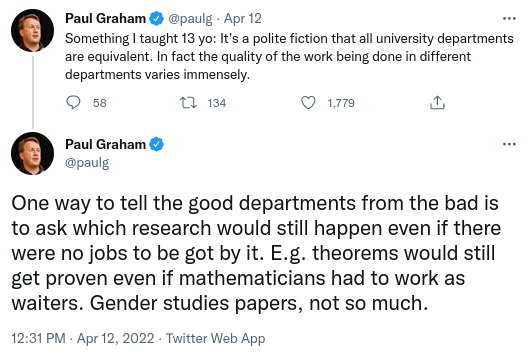-
Two new papers
Well, it’s been a minute.
Although I rarely write about physics on here (or much of anything these days), this is still technically a “research blog”, so I thought I might share an update for those of you who still have me in your RSS feeds.
First, David Poland and I showed that 3d Gross–Neveu–Yukawa CFTs have exactly two relevant scalars operators for N ≥ 2. In plain English, this means that if you’re looking for a quantum critical point in a fermionic system with a scalar order parameter, you only need to tune two parameters to reach it—as long as you have at least two kinds of fermions. The N=1 case corresponds to the super-Ising model, which does have a third relevant scalar and therefore lives in a 3d phase diagram.
(Strictly speaking, N refers to the number of Majorana degrees of freedom. In 3d, a Dirac spinor factorizes into four Majorana spinors, so a system with N/4 Dirac fermions will have a global symmetry group of O(N) or O(N/2)² ⋊ Z₂, depending on what the Yukawa coupling looks like. For more details, see appendix C of the “The Gross–Neveu–Yukawa archipelago”.)
Second, I contributed to a new bootstrap study of stress tensors in the critical 3d Ising model! Highlights include tighter bounds on critical exponents, bounds on the scaling dimensions of parity-odd operators, and some preliminary evidence that the Ising model is extremal in the space of CFTs. It’s also “1.3833683(35)% fermionic”—see our discussion section for an attempt to interpret this number.
-
Half-baked Nobel predictions
Happy Nobel season, everyone! I thought I might post my predictions publicly this year, so when I’m proven wildly off-base, I can take solace in the fact that I gave everyone a good laugh. And hey, if I get one right, I’ll be able to brag about it.
I’m limiting myself to 3 serious predictions per prize.
Medicine:
Most of what I know about the current state of biology comes from talking to biophysicists at parties, which makes this a tricky one.
Predictions: This year’s obvious favorite is someone who worked on the mRNA COVID vaccines. A biologist friend suggested optogenetics, so I’ll shamelessly steal it (thanks Eric!). And maybe Mary-Claire King, for discovering BRCA.
Who do I want to win, even though they have no chance? Tang and Wiesenfeld for self-organized criticality.
Physics:
The last prize was in complex systems, and three of the last five were some form of astrophysics. Not much prizeworthy has happened on the hep-ex front since the Higgs, so I think it’s safe to assume the new one will be in condensed matter or AMO.
Predictions: From an outsider’s point of view, the most likely discoveries to win seem like twisted bilayer graphene (Jarillo-Herrero et al), slow light (Hau et al), and the Bell inequality tests (Aspect et al). Quantum computing strikes me as a possibility in a few years, once the quantum supremacy claims are more substantiated, but not right now.
Who do I want to win, even though they have no chance? Literally any field theorist.
Chemistry:
Predictions: Somehow, nobody’s won a Nobel for quorum sensing or metal-organic frameworks yet! Wolf prizes have been awarded for both (Bassler and Yaghi respectively), which should boost the odds a bit more. Drug-design people seem very excited about targeted protein degradation, but I get the sense that it’s pretty new and might just be a flash in the pan, so I’ll use my third prediction on the AlphaFold team.
Who do I want to win, even though they have no chance? The guys who made aducanumab—just to fuck with everyone.
Literature:
Everyone always bets on Murakami, but they’re starting to sound like the “year of desktop Linux” people. Ngũgĩ would normally be my top choice, but Gurnah won last year, so I think they might wait a bit on him.
Predictions: The vote occurred after Salman Rushdie was stabbed, so assuming someone nominated him, he could be an even more likely contender than usual. Selecting László Krasznahorkai would make me very happy, and what’s more, he’s the sort of writer who the committee tends to like. And while I’m on the theme of “authors who’ve become quizbowl in-jokes,” I could easily see Edwidge Danticat winning as well.
Who do I want to win, even though they have no chance? Thomas Pynchon. Or, if I happen to be on Twitter that day, Joyce Carol Oates.
Peace:
Peace Prize forecasting is another hard one, if only because it’s so tempting to bet on people who’ve been in the news recently. But since I don’t have the time to Google for notable activists, I’m going to do just that.
Predictions: Alexei Navalny, Greta Thunberg, or Joe Biden.
Who do I want to win, even though they have no chance? Pussy Riot.
Economics:
Predictions: Most economists I can name have either already won, or (in my opinion) don’t deserve to. The three most famous people who don’t fit that description are Daron Acemoglu, Raj Chetty, and Thomas Piketty.
Who do I want to win, even though they have no chance? Whoever created the first Nobel Prize prediction market.
These are all, of course, based entirely on vibes. Don’t read to much into them. And yes, I’m well aware that the Nobels are flawed and overrated and [gasp] Problematic—that only makes this kind of speculation more fun!
Update (Oct 3): Whoops, it looks like I forgot econ when I was writing this last night. And Alex Shephard’s annual lit prize roundup is finally out!
-
Greetings from Portugal!
I’ve been in Porto the past few weeks for Bootstrap 2022. The conference has been a wonderful experience so far (aside from the baffling lack of water fountains in university buildings), and if you’d like to watch some of the talks, you can find recordings on the collaboration’s YouTube channel.
I’m really enjoying exploring the city! Climate-wise, Porto is not unlike San Francisco, so it’s been a welcome change from New Haven’s usual summer mugginess. The food and wine are quite good as well—the francesinha is a local sandwhich which deserves to be much better-known in the US, and the region is home to both port and vinho verde, neither of which I’d tried before this trip. I expected more of a language barrier, but it’s been possible to get around with only a few basic phrases.
I’ll be in Boston on Saturday and back in New Haven after that. If you happen to be in either city and we know each other IRL, send me a message and we’ll grab lunch.
Pictures (more to follow):
 Porto, as seen from the Douro river on St. John’s Eve
Porto, as seen from the Douro river on St. John’s Eve The Douro, from the north this time
The Douro, from the north this timeA few of us also traveled to Lisbon for the weekend:
 more from the same cathedral
more from the same cathedral more from the same cathedral
more from the same cathedral A chapel in the Igreja de São Roque
A chapel in the Igreja de São Roque Castelo dos Mouros, constructed in the 9th
century
Castelo dos Mouros, constructed in the 9th
century -
Links for June 2022
The Pudding has a lovely interactive story on randomness, outliers, and the replication crisis.
DALL-E 2 messing up corporate logos
Posting Wordle-like games is probably passé by now, but a friend turned me on to Tradle. It’s similar to World-le, but you get a list of exports instead of a silhouette. [EDIT: Artle exists too!]
An old post on the “monads are like burritos” fallacy. There’s probably a takeaway for physics pedagogy as well.
In 2018, a short-lived cryptocurrency news site hired Laurie Penny to go on a “blockchain cruise” and write about the experience. The site doesn’t exist anymore (presumably because they alienated their core audience with decisions like “commission articles from Laurie Penny”), but the piece is still available on the Internet Archive. I promise you won’t regret reading it.
SMBC on the value of a liberal education
I wrote a term paper on the monstrous moonshine theorem this semester. These TASI notes by Cheng and Anagiannis are a great resource, as is the chapter on VOAs in The Princeton Companion to Mathematics.
While I’m posting arXiv links, my non-physicist readers might enjoy learning that the canonical AdS/CFT review is nicknamed “MAGOO.”
Twitter appears to have worked itself into a huff over sex scenes in movies, so go read “Everyone Is Beautiful and No One Is Horny”.
An Auden poem I quite like.
Wikipedia articles:
Campaign for the neologism “santorum” (no images, but text is NSFW)
-
Paul Graham, esoterically
The following Paul Graham tweet has been making the rounds recently:

Unsurprisingly, I think this tweet is wrong. Moreover, I think it’s laughably wrong, but not in quite the same way everyone else seems to. The general thrust of the dunks has been “has Paul Graham ever met a mathematician?” Well, I have met mathematicians, and I think Graham is basically right about them. Sure, if a single mathematician can’t get a research job, they might stop proving theorems and find other vaguely-technical work—think of a mathematician or physicist you know who didn’t get a job in academia. But if no one were proving new theorems, I would be shocked if hobbyists didn’t take up the mantle. The progress of the field would suffer massively (though more on the theory-building side than the problem-solving one), but it wouldn’t stop. Graham’s error is in thinking the same isn’t true of gender studies.
With that out of the way, there are several more things I could say about this tweet:
I could point out the abysmal state of the faculty job market in the humanities—certainly worse than in math—which ensures that roughly zero people go into gender studies because there are “jobs to be got by it.”
I could suggest that framing gender studies scholars as cynical rent-seekers reflects an internalization of right-wing culture war narratives (corporate diversity consultants are another matter, but the tweet is about academics).
I could bring up 2010s Tumblr culture, which is proof that people will devote staggering amounts of their spare time to debating the ontology of gender.
I could point out the well-established fact that Paul Graham reads Slate Star Codex, so he should know better than to make this argument. Say what you will about Scott Alexander, but you can’t deny he’s written many essays—including some extremely good ones—that fall under “gender studies.”
I could point out how this is at odds with the standard techie critique of humanities majors—that they’re stuck in a state of arrested development, “majoring in a hobby,” and need to realize that life isn’t all fun-and-games and learn some valuable skills.
And lastly, I could argue that Graham, having amassed millions of dollars and established a loyal internet following, is has become too insulated from the consequences of his ideas. That he just farts out half-baked and inconsistent statements that anyone (including Graham himself!) could debunk with 30 seconds of thought. This reading would be well-received by many people, would get me a lot of likes on social media, and would be promptly forgotten after everyone scrolls past it. Regarding authorial intent, it might even be correct.
But I there’s a better, more artful, more uplifting reading of this tweet—one which paints a very different picture of Graham’s actual thoughts on gender studies. To understand why, we need to talk about Leo Strauss.
Strauss was a German-American political theorist who taught at UChicago in the 50s. Today, he’s primarily known for two things: his work on “esoteric writing,” and an academic genealogy with more conservative intellectuals than a Bozell–Buckley family reunion. The latter will have to wait for another time (oh man, will we get to the Straussians), but for now I’d like to discuss esotericism. Strauss was interested in writers living under oppressive regimes that would subject them to ostracism, censorship, or violence if they expressed their ideas outright. According to Strauss, such writers often crafted texts with an exoteric meaning—a banal thesis chosen to maintain plausible deniability—and a more controversial esoteric meaning, which is never stated explicitly, but hidden between the lines for attentive readers.
There are several ways to accomplish this goal. An esoteric writer might make an obviously bad argument for their stated thesis. They might frame their piece as a refutation of heresies, but state the heresies with lively, passionate prose and cutting arguments, before retreating to a dull and pedantic style for the refutation. They might fail to make a refutation at all, ending bluntly with “but this goes against the wisdom of the church and must therefore be wrong.”
This all reminds me of an old SNL sketch, in which Steve Martin plays a medieval barber. From 5:39 in the linked video:
Wait a minute. Perhaps she’s right. Perhaps I’ve been wrong to blindly follow the medical traditions and superstitions of past centuries. Maybe we barbers should test these assumptions analytically, through experimentation and a “scientific method.” Maybe this scientific method could be extended to other fields of learning: the natural sciences, art, architecture, navigation. Perhaps I could lead the way to a new age, an age of rebirth, a Renaissance!
[pause]
Naaaahhh!
An esoteric reading of Paul Graham’s tweet requires two things: a concealed argument, and a reason to conceal it.
The first is obvious. Graham stakes out an exoteric thesis: that math and related fields are “better” than gender studies. He defends it by establishing a criterion for the quality of a field (whether amateurs would care enough to produce new work), and stating by fiat that it applies more to math than gender studies. But any reader—crucially, even one who agrees with Graham’s exoteric thesis—would concede, if they thought about it for a moment, that the criterion is at least as true of gender studies as it is of math. And it’s certainly more true of gender studies than applied fields like software engineering!
So Graham’s esoteric thesis must be that gender studies, and the critical humanities in general, are more socially valuable than his own discipline.
Why would Graham want to conceal this point? Certainly he’s not afraid of Twitter censoring a defense of gender studies. I think there are a couple possible answers. First, he might assume many of his followers won’t be sympathetic to such a defense, and wants to prevent them from dismissing it out of hand. Second, he might want to conserve his social capital in the tech world, as any explicit praise for gender studies would brand him a social justice warrior in they eyes of his VC friends. Esoteric tweeting allows him to make his case to a learned few, while maintaining plausible deniability to everyone else.
But if Graham think gender studies is more valuable than the things he’s devoted his entire career to, what does that say about his future?
I have a guess. At some point, possibly this decade, possibly the next, Paul Graham will exit Y Combinator (he has, IIRC, stopped handling day-to-day operations but still retains an advisory role). He’ll cash out most of his holdings. And then he’ll publish a groundbreaking work of feminist theory, one which transforms our understanding of gender. Berkeley will hold seminars like “Paul Graham in conversation with Judith Butler,” undergrads will discuss him in their philosophy classes, and the time when everyone called Paul Graham an entitled tech bro will be relegated to a historical footnote.
A more magical world is possible. All you have to do is believe.

